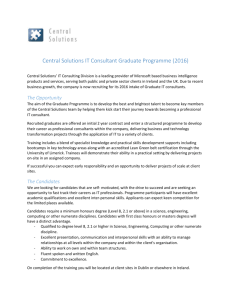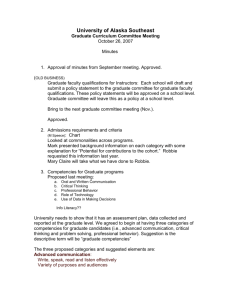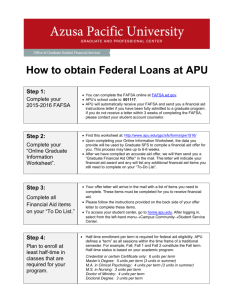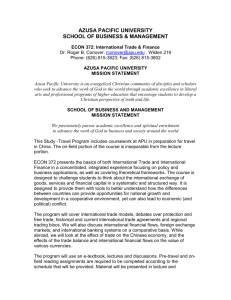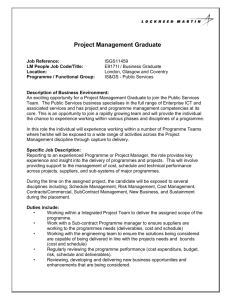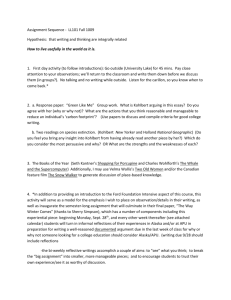EDL 586 Syll
advertisement
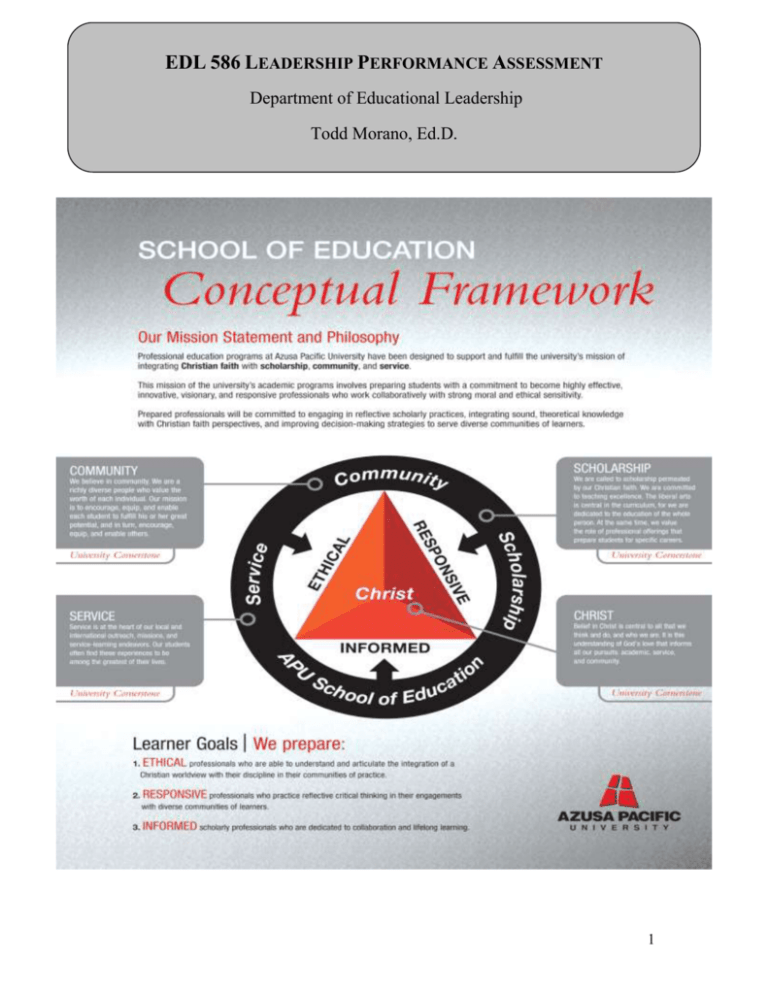
EDL 586 LEADERSHIP PERFORMANCE ASSESSMENT Department of Educational Leadership Todd Morano, Ed.D. 1 Azusa Pacific University Mission Statement: Azusa Pacific University is an evangelical Christian community of disciples and scholars who seek to advance the work of God in the world through academic excellence in liberal arts and professional programs of higher education that encourage students to develop a Christian perspective of truth and life. EDL 586 Spring 2, 2012 Instructor: e-mail: Dr. Todd Morano tmorano@apu.edu COURSE: EDL586 Leadership Performance Assessment Hours: By Appointment 5 Units REQUIRED TEXTS AND STUDY RESOURCES: Marcos, Teri (2009). The Case Study Handbook – Coursepack for EDL586 SUGGESTED READING: Hanson, Karen (2004). Case Study Handbook for Educational Leaders. Corwin Press, Thousand Oaks, CA. Reeves, D. B. (2004). Assessing educational leaders: evaluating performance for improved individual and organizational results. Thousand Oaks, CA: Corwin Press REQUIRED SOFTWARE/WEBSERVICES: http://www.taskstream.com Projects are required to be posted to TaskStream by the last class meeting. (Students who fail to post required signature assignments to TaskStream will receive an Incomplete for the course grade). COURSE DESCRIPTION: This course leads candidates to synthesize the learning they have experienced throughout the previous courses. Candidates will finalize the case studies that have been evolving with input from each previous course. They will develop an analysis of their own Leadership Performance Assessment, including analysis of how their personal Strengths will serve them in leadership positions. Candidates will present the case study and their own Leadership Performance assessment to an evaluative panel as a capstone experience during this final course. They will be assessed on the California Professional Standards for Educational Leaders through rubrics. 2 In that this is the culminating course for the MA in Educational Leadership~Tier I PASC, candidates who have remaining coursework to complete for their program may not enroll in this course until such time as all previous coursework has been completed. AZUSA PACIFIC UNIVERSITY SCHOOL OF EDUCATION LEARNER GOALS (As expressed in the Ethical, Responsive and Informed Educator): Ethical educators who are able to understand and articulate the integration of a Christian worldview in their professional communities of practice. Responsive educators who practice reflective critical thinking in their engagements with diverse communities of learners. Informed and collaborative scholarly educators who are dedicated to professional growth and lifelong learning. STUDENT OUTCOMES AND EXPECTED COMPETENCIES. By the end of this semester the candidate will have had the opportunity to: Learner Goals Become familiar with the professional journals, books, and 2, 3 research materials in educational leadership. Gain an understanding of the basic research processes 3 used in school leadership. Become knowledgeable consumers of professional research findings. 3 Appreciate the importance of research in the progress of society. 2, 3 Acquire an understanding of the ethical principles involved in 1, 3 carrying out a research study and reporting the findings. Establish a research philosophy that is objective, analytic and unbiased. 1, 2 Be encouraged to pursue professional learning and inquiry. 2, 3 Learn the significance of analysis and interpretation of data. 3 Evaluate research methodology. 1, 3 Attain reasonable skills in planning a research project and in writing 1, 2 a research proposal in accordance with the APA format. Review and refine a personal vision of education and instruction that provides 3 multiple opportunities for the candidate to engage in reflection on teaching and learning (CCTC Std. 10a). Articulate strategies for implementing a shared vision in such a way that 2, 3 an entire school community can understand and act on the school mission based upon local, state, and national standards (CCTC Std. 10b). 3 Describe, support, and maintain high expectations for the academic 1, 2, 3 and social development of all students, the enhancement of faculty performance, and the contributions of all adults in the implementation of the school’s vision (CCTC Std.10c). Research and apply change theory to the implementation of instructional 2 programs that enhance student achievement and organizational effectiveness (CCTC Std. 10b). Apply multiple assessment measures to evaluate student learning in a 2, 3 focused inquiry of school improvement that addresses all the students (Std. 11c). Apply research and technology-provided data to design, implement, support, 2 evaluate, and improve an instructional program that serves diverse student learning styles and needs (CCTC Std. 11b). Apply strategies for guiding, motivating, delegating, and building consensus 1, 2 among the diverse constituencies in the school and community to develop, articulate, implement and steward a shared vision of teaching and learning (CCTC Std. 10e). Candidates will additionally have the opportunity to: Describe school programs that evidence a shared vision for achievement. Describe a school culture that values equity, fairness and respect among all members of the school community, blending research, resources, technology, professional development, and accountability to promote student learning. Describe a safe, well-maintained, productive school through efficient management, collaborative decision-making. Explain a process for strengthening the school program by collaborating with families and community members and mobilizing community resources in order to respond to diverse community interests and needs. Identify, explain and defend a personal code of ethics, integrity, justice, commitment, fairness, shared decision-making and personal development. Explain ways to respond to and influence the larger political, social, economic, legal and cultural context of the school. Performance Expectations of Candidates in the MA/PASC To reflect the department’s vision and mission to prepare educational leaders through experiences that promote excellence in their God-given strengths, personal and professional leadership reflection, and best leadership practices that build exemplary schools, candidates are expected to attain the following 10 performance goals: God-Given Strengths (Ethical) Goal 1: broad and deep knowledge of self as a leader; 4 Goal 2: Goal 3: ability to be caring and ethical leaders in order to build teaching and learning environments that draw on the strengths of students’ diverse cultures and learning styles; ability to lead teachers and professional learning communities to be active and effective participants in a political and social democracy; Personal and Professional Leadership Reflection (Informed) Goal 4: strong communication skills; Goal 5: strong technological literacy skills; Goal 6: ability to incorporate information about family and community expectations into school decision-making and activities. Best Leadership Practices that Build Exemplary Schools (Responsive) Goal 7: broad and deep understanding of a shared school vision; Goal 8: ability to identify barriers to accomplishing the vision; Goal 9: ability to shape a culture in which high expectations are the norm for each student; Goal 10: ability to collaborate with the professional educational community; CCTC Standards and California Professional Standards for Educational Leaders (CPSELs) 1. facilitating the development, articulation, implementation, and stewardship of a vision of learning that is shared and supported by the school community (Visionary leadership) Interstate School Leadership Licensure Consortium (ISLLC) National Standards for Educational Leadership a. Facilitating the development, articulation, implementation, and stewardship of a vision of learning that is shared and supported by the school community (Visionary Leadership); 2. advocating, nurturing, and sustaining a school culture and instructional program conducive to student learning and staff professional growth (Professional Culture) b. Advocating, nurturing, and sustaining a school culture and instructional program conducive to student learning and staff professional growth (Professional Culture); 3. ensuring management of the organization, operations, and resources for a safe, efficient, and effective learning environment (Efficient/Effective Learning Environment). c. ensuring management of the organization, operations, and resources for a safe, efficient, and effective learning environment (Efficient Operation/Effective Learning); 4. collaborating with families and community members, responding to diverse community interests and needs, and mobilizing community resources (Responsive to community). d. collaborating with families and community members, responding to diverse community interests and needs, and mobilizing community resources (Responsive to Community); 5 5. modeling a personal code of ethics and developing professional leadership capacity (Ethical Leadership). 6. responding to, and influencing the larger political, social economic, legal, and cultural context (Politically and Culturally Sensitive Understanding) e. acting with integrity, fairness, and in an ethical manner (Ethical Leader); f. promotes the success of all students by understanding, responding to, and influencing the larger political, social economic, legal, and cultural context (Politically & Multiculturally Sensitive) Assignments mandated for all sections of the course and used as program assessment data to demonstrate collective student mastery of the associated CPSELs, CCTC, or ISLLC standards COURSE OUTLINE: The following topics will comprise the overall course content and presentations: Candidates will work independently and/or in small groups with APU faculty and site supervisors to defend a leadership case study that has evolved across the program with input from each sequenced course. Additionally, they will submit a written summative document of their case study and a self-assessment Leadership document based upon the California Professional Standards for Educational Leaders and APU’s MA/PASC’s eight strands for leadership. COURSE REQUIREMENTS ATTENDANCE AND PARTICIPATION Students are expected to take an active role in all scheduled class sessions and activities. The climate and learning experiences of the classroom are nearly impossible to capture by reading the notes of another individual. Class attendance will have a direct bearing on one’s overall evaluation. In that just nine face-to-face sessions, with nine online sessions are scheduled, individuals finding it necessary to be absent twice should consider a withdrawal from class. ONLINE THREADED DISCUSSIONS Individuals are invited and highly encouraged to login asynchronously within each of the nine work weeks of the course as a supportive component for questions and responses from peers and faculty. Collaboration within and among teams during periods of increased workload, particularly workloads with deadlines, increases the productivity of not only the team as a whole but of the individual members as well. Candidates are encouraged to use the course site for posting their progress for feedback, as well as to read and comment on the work of their class counterparts. READINGS IN RESEARCH (3) Individuals will progress toward initiating and conducting research through a weekly inquiry, examination, and evaluation of reported research findings. These may be taken from journals, the Internet, or magazine and news articles. Findings will be reported in 6 class weekly, with regard to bias, support of literature, and appropriate application of data analysis and conclusions. Presented in no more than one page, double-spaced, 12 font. CASE STUDY Candidates will work independently and/or in small groups with APU faculty and site supervisors to defend a leadership case study that has evolved across the program with input from each sequenced course. Candidates will submit their case study based on the Progress of Assignments criteria below: PROGRESS OF ASSIGNMENTS FOR CASE STUDY (Due Weekly) A series of assignments is designed to assist students by monitoring progress and providing feedback in completion of the final research report. DUE Research Question and Method/Instrument Introduction/Background of Case Study and Problem Statement Review of Literature and List of References Findings and Analysis Discussion of Results Summary and Conclusion Final Case study to include: Cover page, Table of Contents, and Appendices In Class Presentation of Case Study in Small Group *Final Case Study Uploaded to Task Stream by Week #8. Week 2 Week 3 Week 4 Week 5 Week 6 Week 7 Week 8* Week 9 COLLOQUIA PRESENTATION Case Study presentations will be scheduled for candidates on main campus. A schedule for the Colloquia will be available from the Department office. PROFESSIONAL GROWTH PLAN and LCAS Used as a self-assessment based upon the California Professional Standards for Educational Leaders and APU’s MA/PASC’s eight strands for leadership, candidates will dialogue their growth in class including areas of strength and improvement using the candidate’s Leadership Competency Analysis Survey results (LCAS) and StrengthsFinder Inventory Assessment. COURSE EVALUATION AND ASSESSMENT The candidate’s written case study report and Professional Growth Plan self-assessment will be evaluated on a four point rubric. The candidate’s oral presentation will also be evaluated by a team of university professors and current educational practitioners on a four point rubric. COURSE EVALUATION PLAN: A (Grading Rubrics) Exceptional quality. Instructor’s expectations for the assignment have been exceeded. Careful, accurate analysis and keen insight characterize the work. Comprehensive knowledge of relevant disciplines and mastery of course 7 content is reflected through original interpretations. Oral and/or written expression of work is professional in quality and indicates creative thought. A- Excellent quality. Instructor’s expectations for the assignment have been met. Oral and/or written expression of the work meets standards normally associated with graduate school. B+ Superior quality, although some aspect of the assignment falls short of expectations. Oral and/or written expression of the work meets standards normally associated with graduate school. B Acceptable quality, although more than one aspect of the assignment falls short of expectations. Oral and/or written expression of the work meets standards normally associated with graduate school. B- Acceptable quality, although more than one aspect of the assignment falls short of expectations. Oral and/or written expression of the work meets minimal expectations associated with graduate school, but the quality of the composition or presentation detracts from the content. C Inferior quality, barely meeting minimal expectations for graduate credit. Oral and/or written expression of the work does not meet standards normally associated with graduate school. F Unsatisfactory work. COURSE POLICIES: Academic Integrity: Professional educators should be held to the highest standards of academic honesty. The Graduate Catalog specifically addresses this expectation in the following statement: The maintenance of academic integrity and quality education is the responsibility of each student at Azusa Pacific University. Cheating or plagiarism in connection with an academic program is an offense for which a student will be expelled, suspended, or disciplined. Academic dishonesty is a serious offense, which diminishes the quality of scholarship and defrauds those who depend upon the integrity of the educational system. Citations: Written work requiring references will be prepared according to the Publication Manual of the American Psychological Association. (APA Format). Azusa Pacific University, in compliance with Title VI and VII of the Civil Rights Acts of 1964, and Title IX of the Educational Amendments of 1972, does not discriminate on the basis of race, color, national origin, gender, age, disability, status as a veteran, or any other characteristic protected by law, in any of these policies, practices, or procedures. 8 In compliance with section 504 of the Rehabilitation Act of 1973, Azusa Pacific University does not discriminate on the basis of disability in the recruitment and admission of students, or in the operation of any of its programs and activities, as specified by federal laws and regulations. Students with Disabilities: Students in this course who have a disability that might prevent them from fully demonstrating their abilities should meet with an advisor in the Learning Enrichment Center as soon as possible to initiate disability verification and discuss accommodations that may be necessary to ensure full participation in the successful completion of course requirements. Available Support Services: Learning Enrichment Center; Library; Media & Computer Centers; Technology. Students with Disabilities: Any student in this course who has a disability that might prevent her/him from fully demonstrating her/his abilities should meet with an advisor in the Learning Enrichment Center as soon as possible to initiate disability verification and discuss accommodations that may be necessary to ensure your full participation in the successful completion of course requirements. Support services are available in the Learning Enrichment Center for persons desiring additional assistance in the course. Students who are not attending the central campus may discuss options and accommodations with the course instructor and the local Campus Director. LIBRARY AND MEDIA SUPPORT SERVICES: APU maintains excellent library and on-line, full-text databases available to all registered students. It is highly recommended that you visit the Darling (Graduate Library) and the Marshburn (Undergraduate Library), to become familiar with on-line databases. Cougar’s Den will be utilized throughout your graduate program. For more information on computing and internet access contact the IMT department at (626)815-5050 and let them know you are an off-campus graduate student and would like to establish your own internet account. Write the Names, Telephone Numbers, and E-Mails of two class members here: (1)_______________________________________________________________ (2)_______________________________________________________________ INSTRUCTOR AVAILABILITY: In an effort to assist with individual growth, questions and/or conflicts, the instructor will be available before and after each scheduled class session, as well as through email and phone during the week. 9 Internet Resources for EDL586 Leadership Performance Assessment: www.apu.edu APU’s on-line library contains electronic searching capabilities for books, journals, ERIC documents, as well as other databases. Requires APU identification. www.cde.gov The California Department of Education’s official website. www.ascd.org Association of Supervision and Curriculum Development contains resources on current trends and issues in staff development and curriculum. www.edsource.org The official web site for EdSource contains resources on California school improvement issues as well as databases on school and pupil performance. www.accesseric.org The web site for ERIC contains database and on-line searching capabilities for documents from all the clearinghouses. It includes the thesaurus for descriptors. www.nassp.org National Association of Secondary School Principals web site contains resources on current issues in secondary curriculum. www.nmsa.org National Middle School Association web site contains resources on current issues in middle school curriculum. www.goldmine.cde.ca.gov California Department of Education web site contains resources on California school improvement issues, grant opportunities, as well as various databases. www.edreform.com The Center for Education reform web site contains resources on national school improvement issues as well as databases on school and pupil performance. www.ed.gov The U.S. Department of Education web site contains resources on federal school improvement issues, grant opportunities, as well as various databases. www.californiaresearchbureau The official website of the California State Library Report Center. Bibliography for Educational Leadership586-Performance Assessment 10 Clifton, D. O. & Anderson, E. (2001). StengthsQuest, Washington, D.C.: The Gallup Organization. Marzano, R. J. (2003). What works in schools: Translating research into action. Alexandria, VA.: ASCD. Reeves, D. B. (2004). Accountability in action (2nd ed.). Englewood, CO: Center for Performance Assessment. Reeves, D. B. (2004). Assessing educational leaders: Evaluating performance for improved individual and organizational results. Thousand Oaks, CA. Corwin Press. Reeves, D. B. (2002). Holistic accountability: Serving students, schools and communities. Thousand Oaks, CA. Corwin Press. Schmoker, M. (2000). Results: The key to continuous school improvement (2nd ed). Alexandria, VA: ASCD. Taylor, C. S. & Nolen, S. B. (2005). Classroom assessment: Supporting teaching and learning in real classrooms. Upper Saddle River, N.J: Pearson, Merrill, Prentice Hall. READINGS IN RESEARCH 11 The Researcher as Consumer FORMAT In no more than one page, please format your weekly research readings as follows and be prepared to share your findings each week in class. Pages 57-70 in the text supply a rich list of journal, literature, and Internet resources. 1. Title of Research 2. Source (Journal, Textbook, Internet, News Article, TV, etc.) 3. Date 4. Survey of Research (Synopsis) 5. Was researcher objective or biased? Discuss. 6. Was the researcher systematic in providing answers to the inquiry? Research question(s), problem and purpose statements, methodology, data collection, interpretation of results and conclusions. 7. Can the research be inferred to a larger population? Explain. 8. Were the conclusions accurate and trustworthy? Discuss. 9. State one new question arising from your reading of this research. 12
